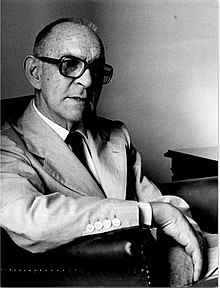Salvador Espriu
Salvador Espriu i Castelló (born July 10, 1913 in Santa Coloma de Farners , † February 22, 1985 in Barcelona ) was a Spanish writer .
Espriu is considered one of the most important poets in Catalan literature . His works have been translated into numerous languages, and Espriu has been nominated for the Nobel Prize for Literature several times . Some of his lyrics have been set to music, for example by the Catalan songwriter Raimon . In addition to poetry, Espriu also wrote novels and plays. Central motifs in his work are death and the question of home.
Life
Espriu grew up in Santa Coloma de Farners and Barcelona . The family came from Arenys de Mar , a place that shaped Espriu very much and appears in many of his works. The fictional Sinera in the title of his volume of poetry The Sinera Cemetery is an anagram of Arenys.
Esprius' older brother Francesc died in an accident while on vacation. Espriu developed pleurisy at the age of nine and was bedridden for three years due to complications. During this time he lost a second of his four siblings.
In 1929 Espriu published his first texts with the book of stories Israel . They are still written in Spanish and are inspired by Old Testament events.
After graduating from high school, Espriu studied law and history from 1931 to 1936. When the Spanish Civil War broke out, Espriu did not have to go to the front because of his poor physical condition, but served as a lawyer at a military tribunal on the part of the Republicans.
In 1946 Espriu published his first volume of poetry, Cementiri de Sinera . In the years that followed, the poet became increasingly famous for his poetry and plays in the Catalan language . Andreas Dorschel sees Esprius' work as an "attempt to save Catalan with poetic means". Since the Franco regime tried to suppress this language in favor of Castilian, which was elevated to the Spanish national language, Espriu also came into conflict with the state on several occasions.
In the 1970s and 1980s Espriu received several awards, including the Montaigne Prize from the University of Tübingen , honorary doctorates from the Universities of Barcelona and Toulouse, and the gold medals from the city of Barcelona and the Catalan government. He rejected the civil order of Cruz Alfonso X el Sabio , which Espriu was awarded in 1982.
Works
- Cementiri de Sinera (1946), German The Sinera Cemetery
- Primera història d'Esther (1948)
- Les hores (1952), German The hours
- Mrs. Death (1952)
- El caminant i el mur (1954), German The Wanderer and the Wall
- Final del laberint (1955), German end of the labyrinth
- La pell de brau (1960), German: The bull skin
- Llibre de Sinera (1963), German book by Sinera
- Setmana Santa (1970), German Holy Week
- Les roques i el mar, el blue (1981)
- Per a la bona gent (1982), Ger. For the good people
Translations
- The poems have been translated into German by Fritz Vogelgsang (Salvador Espriu: Das Lyrische Werk . 3 vols. Zurich: Ammann Verlag 2007)
- Fritz Vogelsang: The bull skin , Catalan / German. Vervuert Verlag, Frankfurt am Main 1987, ISBN 3-921600-37-5 .
- A selected volume has been published by Piper Verlag ( ISBN 978-3492110839 ). It includes texts from The Wanderer and the Wall , End of the Labyrinth and The Bull Skin .
literature
- Kurt Süss: Investigations into the poetry of Salvador Esprius. Nuremberg 1978, ISBN 3-418-000-592 .
Individual evidence
- ↑ "Cementiri de Sinera" in: Pobles de Catalunya , with photos, publisher: Center d'Estudis i Divulgació del Patrimoni
- ↑ Andreas Dorschel, Songs of Ariadne. The great Catalan poet Salvador Espriu. In: Süddeutsche Zeitung , October 15, 2007. Ramon Farrés discusses aspects of Dorschel's text in Fritz Vogelgsang: Salvador Esprius Translator into German. In: Zeitschrift für Katalanistik 23 (2010), pp. 39–52.
- Salvador Espriu , Catalan Writers' Association.
| personal data | |
|---|---|
| SURNAME | Espriu, Salvador |
| ALTERNATIVE NAMES | Espriu i Castelló, Salvador (full name) |
| BRIEF DESCRIPTION | Spanish writer |
| DATE OF BIRTH | July 10, 1913 |
| PLACE OF BIRTH | Santa Coloma de Farners , Spain |
| DATE OF DEATH | February 22, 1985 |
| Place of death | Barcelona , Spain |

